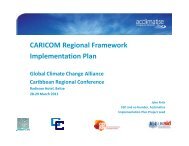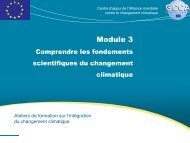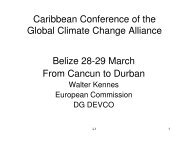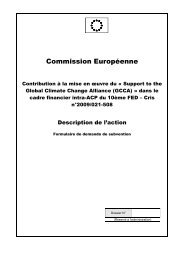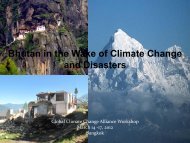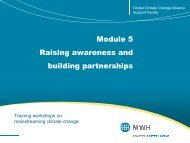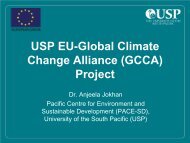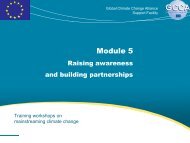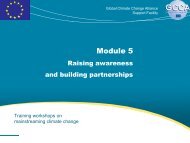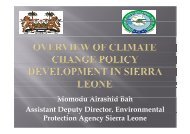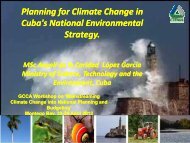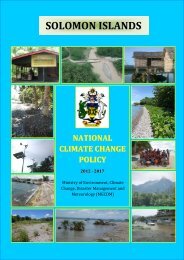Rwanda Green Growth Strategy 18nov11 - Global Climate Change ...
Rwanda Green Growth Strategy 18nov11 - Global Climate Change ...
Rwanda Green Growth Strategy 18nov11 - Global Climate Change ...
Create successful ePaper yourself
Turn your PDF publications into a flip-book with our unique Google optimized e-Paper software.
Chapter 4Programme 12: Sustainable Forestry, Agroforestry and Biomass EnergyTo meet energy demands for biomass it is necessary to ensure that supply meets or exceedsdemand. Controlled tree planting through afforestation, reforestation, agroforestry and urban tree plantinginitiatives provides wood for fuel, improves slope stability supports food security and acts as a carbon sink,and can therefore earn carbon credits. To ensure sustainability of these initiatives, <strong>Rwanda</strong> will• Promote afforestation/reforestation of designated areas through enhanced germplasm andtechnical practices in planting and post-planting processes;• Employ Improved Forest Management for degraded forest resources;• Formulate a joint strategy for agroforestry between MINIRENA and MINAGRI;• Mandate licensing of sustainable charcoal production techniques and promote improvedcookstoves for efficient and clean wood and charcoal consumptions.Programme 13: Disaster Management and Disease Prevention<strong>Rwanda</strong>’s hilly topography and high annual precipitation rates bring high risks from flooding, storms,landslides and vector and water-borne diseases, while other natural disasters include droughts andearthquakes. Over-exploitation of the natural environment such as deforestation and inappropriate farmingon steep slopes increases the hazard risk, which may be exacerbated through climate change as anincrease in extreme weather events occurs. To develop effective disaster management systems, <strong>Rwanda</strong>will• Conduct risk assessments, vulnerability mapping and vector-borne disease surveillance;• Establish an integrated early-warning system, and disaster response plans;• Incorporate disaster and disease considerations into land-use, building and infrastructureregulations; and• Employ community-based disaster risk reduction (DRR) programmes designed around localenvironmental and economic conditions, to mobilise local capacity in emergency response, andto reduce locally-specific hazards.Programme 14: <strong>Climate</strong> Data and Projections Robust observed climate data and climate projections for <strong>Rwanda</strong> are crucial to understanding thecurrent and future impacts of climate change and developing scenarios to assess the potential adaptationstrategies for <strong>Rwanda</strong>. The <strong>Rwanda</strong> Meteorological Service is executing its five-year Strategic Plan toupgrade its network of meteorological stations. In addition <strong>Rwanda</strong> will• Arrange additional observations to provide all climate information necessary for future monitoring,climate trend detection, management of climate variability, early warning and disastermanagement;• Establish a team to produce and interpret climate change projections for <strong>Rwanda</strong>, with a focus ondisseminating climate model data in a user-friendly format for use by all stakeholders; and• Develop the capacity in climate science necessary to underpin this work by incorporating climatescience into secondary school and university curricula.• Enhance the use of climate data in disease prevention and mitigation programmes for humanhealth and agricultural crop productivity.26Government of <strong>Rwanda</strong>



